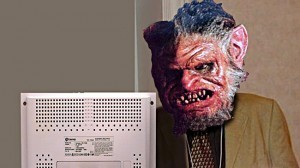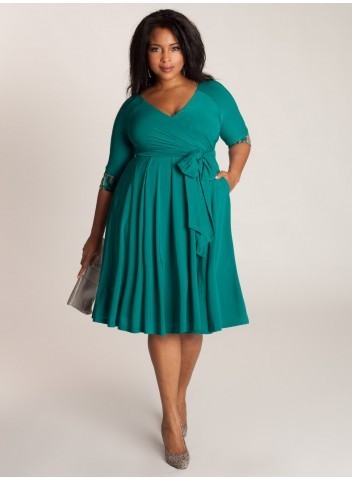Golda Poretsky's Blog, page 8
June 3, 2013
A Few Thoughts On The Youtube Trolls And Why It Really Is Okay To Be Fat And Visible
A pretty accurate depiction of an internet troll
I really, really wanted my TEDx talk on “Why It’s Okay To Be Fat” to go viral.And it kind of did go viral. I just didn’t think it would happen the way it did.
Within a day or two of the talk going live on youtube, troll groups on bodybuilding forums and reddit set out to systematically shut it down. Within less than a week, they had written around 3,000 comments, voted down or marked as spam any supportive comments, and did everything in their power to get as many thumbs down on the video itself as possible.
Comments are now disabled, mainly because many of my supporters contacted the TEDx people and convinced them to turn off the comments. (A GAZILLION THANKS TO ALL OF YOU, BY THE WAY.)
It seemed like about 5% of the negative comments were of the, “DUH! Fat is bad!!!” variety and the other 95% were personal attacks on my appearance. I got called everything from a fat whale (yeah, whales are terrible, I guess?), a fat cunt (again, not a terrible thing), to Chris Christie (I’m not a fan of his politics, but his fatness doesn’t bother me in the least).
To be honest, there were definitely moments when the comments got to me. Seeing a comment about your hideousness get 50 likes doesn’t exactly shore up your ego.
At the same time, I feel like I’m pretty much the perfect person for this to happen to, because I really can take it. I’ve been practicing and teaching body acceptance for so long that mean comments on the internet don’t hurt me the way they would someone less body loving. I’m really serious about my deep spiritual practice of not giving a shit.
The thing that upset me most about this experience was all of the emails I got from folks who said “your experience with these trolls is the reason I don’t have a vlog/ web presence/ more visibility in my work.” And that really, really bummed me out. Because my not so secret mission in life is to empower plus sized women to do the things in life that they really want to do. I hated that the trolls of this world had gotten the better of them.
That’s the thing that scares me most. I don’t fear trolls; I fear their chilling effect.
Every time you stop yourself from doing something because you’re worried about what trolls will do, they win.
So here’s my take on trolls. I think there are ways to manage trolls, and I feel like the last two weeks have been a helpful crash course for me. I hope this will be empowering for you.
Trolls Are Assholes — Pardon my French on this, but trolls are assholes. Think about it — when you disagree with someone, do you call them names, make fun of their appearance, publicly wish for their death, and hide behind internet anonymity? Probably not. You might argue with them a bit, or you might move on with your life or both. Trolls are sad little dipshits emboldened by other sad little dipshits, masquerading as much tougher dipshits. That’s all. When you think of it that way, how can they have any impact on how you feel about yourself and live your life?
Make Fun Of Trolls Whenever You Feel Like It — I used to have a firm “ignore all trolls” policy. I still have that policy for fora outside of twitter. But on twitter, all bets are off. Twitter is the most fun place to make fun of trolls because you’ll notice that (a) they have no followers, (b) they are terrible at witty banter, and (c) your twitter friends can join in and have a good laugh.
Here are a few of my favorites:
@biceppeak You seem to think that I’m interested in what you think, and I’m using the word “think” very liberally.
— Golda Poretsky, HHC (@bodylovewellnes) May 31, 2013
I think there’s a video on that. RT @piccdk: @bodylovewellnes Can you please explain to me why is it okay to be fat?
— Golda Poretsky, HHC (@bodylovewellnes) May 28, 2013
Really? That’s all you’ve got? Work on it and get back to me. RT @mattobadia: @bodylovewellnes go lose weight fatty
— Golda Poretsky, HHC (@bodylovewellnes) May 28, 2013
Never Give Trolls What They Ask For — Don’t debate with trolls. Trolls will often demand that you debate with them, send them more info, comment on XYZ. You owe them nothing. If someone is pleasant and asks for something, that’s one thing. But if they’re insulting in any way, don’t give them an inch. Mark them as spam or block them and move on. Don’t reply unless it feels fun to do so.
If this helps you, great. And if you disagree with it, that’s fine too. Just please don’t let them stop you from doing your thing!
By the way, if you’re looking to have a more body loving summer, you’re going to love The Summer Of Body Love. Click below to check it out.
Golda is a certified holistic health counselor and founder of Body Love Wellness, a program designed for plus-sized women who are fed up with dieting and want support to stop obsessing about food and weight. To learn more about Golda and her work, click here.
Get great body love tips and more when you subscribe:
Name:
Email:
(Listen to this post here, or subscribe on itunes.)
A Few Thoughts On The Youtube Trolls And Why It Really Is Okay To Be Fat And Visible originally appeared on Body Love Wellness (http://www.bodylovewellness.com) on June 3, 2013.

May 29, 2013
Igigi Giveaway This Week!
Hi, my dears!
As some of you may remember, Igigi dressed me for my TEDx talk on Why It’s Okay To Be Fat.
They actually sent me two dresses to try. Rather then send the other one back to them (I had kept the Bardot dress), I asked if I could give it away on my blog, and they said yes!
So, I’m giving away the super lovely Jaqueline 2-in-1 dress pictured here, which retails for $108, in a size 22/24:
To enter the giveaway, just:
1) Go to my TEDx video page and give it a thumbs up! (Comments are now disabled, so the trolls can’t attack anymore.)
2) Write a comment below about where you plan to wear the dress. Make sure to write your email address if you’re not using facebook comments.
That’s it!
Note again that the winner will receive a Jaqueline dress in the color jade in a size 22/24.
The winner will be chosen at random and announced next Wednesday, June 5th! I’ll be emailing the winner!
Get great body love tips and more when you subscribe:
Name:
Email:
Golda is a certified holistic health counselor and founder of Body Love Wellness, a program designed for plus-sized women who are fed up with dieting and want support to stop obsessing about food and weight. To learn more about Golda and her work, click here.
Igigi Giveaway This Week! originally appeared on Body Love Wellness (http://www.bodylovewellness.com) on May 29, 2013.

May 20, 2013
Check Out My TEDx Talk On “Why It’s Okay To Be Fat” Right Here!
Hey loves!
I’ll be back next week with our usual programming, but in the meantime, I’d love for you to check out my TEDx video on “Why It’s Okay To Be Fat.”
You can watch it right here:
Please be sure to give it a thumbs up!
And if you get a chance, I’d love it if you could go over to youtube and give it a positive comment. If you could share that video that would be great too! Every little bit helps.
Click to tweet:
Check out this great @TEDx talk by @bodylovewellness on “Why It’s Okay To Be Fat!”
It’s so important that it get likes and views right now while it’s new. That’ll help it go viral, which would be amazing. To my knowledge, this the first TED or TEDx video on Health At Every Size and/or fat acceptance, so we need to represent!
I think you’ll really love the video. Here are a few things I share in the video:
What it was like going on my first diet at age 4.
Why all dieting is yo-yo dieting.
What it’s like to have what I call “scale-dependent self esteem.”
The truth about how often diets fail.
What the “obesity paradox” really means.
Why Health At Every Size principles are so healing.
And even more!
Thanks!
xo,
Golda
P.S. Come back tomorrow for a special giveaway . . . I’ll have more details in 24 hours.
P.P.S. Many thanks to all the folks who already liked it and shared it! You’re awesome!
Get great body love tips and more when you subscribe:
Name:
Email:
Golda is a certified holistic health counselor and founder of Body Love Wellness, a program designed for plus-sized women who are fed up with dieting and want support to stop obsessing about food and weight. To learn more about Golda and her work, click here.
(Listen to this post here, or subscribe on itunes.)
Check Out My TEDx Talk On “Why It’s Okay To Be Fat” Right Here! originally appeared on Body Love Wellness (http://www.bodylovewellness.com) on May 20, 2013.

May 13, 2013
The “Good Kind” Of Fat
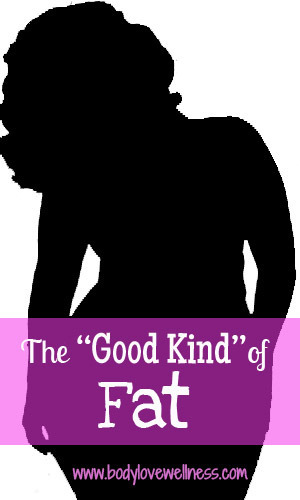 It was only about 6 or 7 years ago that I thought that I could accept my fat if I could just be “the good kind of fat.”
It was only about 6 or 7 years ago that I thought that I could accept my fat if I could just be “the good kind of fat.”
I thought that if I could have that really hourglass figure that plus size models often seem to have, then, and only then could I accept my fat.
Of course, that got me nowhere since it’s pretty impossible to change your shape without a bunch of cosmetic surgery, and “elective surgery” is not really in my vocabulary.
Curvy Privilege?
I hadn’t thought about wanting a different kind of fat body in a long time, but this concept came up with a client recently. She said that from my pictures, she thought I had that “good kind of fat” body and worried that I might not understand what it’s like not to have that. This client is actually quite a bit thinner than me, but she thought that I was “very curvy” and therefore wouldn’t understand what it’s like to have a less curvy* fat body.
I found this very interesting on a number of levels, and I found myself reassuring her that I, indeed, did not have a very curvy body (there’s about a one inch difference between my hips and my waist) and that even if our body types are not alike, that I can still understand and empathize with her, since that’s what I do for a living!
But beyond that, I got to thinking about how “the good kind of _________” shows up in various minority groups, where the “good kind of” whatever is always whatever looks the most like what is prized in the dominant culture. If you have the “right” skin color or hair color or nose shape you might just pass for the dominant culture and get whatever privilege may be attached to that.
Click to tweet: Your fat IS the “good kind” of fat!
And so I think the same thing happens with fat. If you’ve got “curves in all the right places” and you’re fat, you may get snippets of thin privilege that would be denied to a fat person of relatively the same size but with a different shape. Of course, I’m talking about female identified people when I’m talking about curvaceousness. Perhaps it works the opposite way with male identified folks, but I’m not sure.
I recognize that I get little snippets of thin privilege myself — because my hips are relatively narrow, I don’t have to worry about things like sitting in airline seats, and I don’t have to deal with people looking at me with dread that I might (OMG!!!) sit next to them (the subway, however, is a different story). But I’m fat enough that I can’t ever “pass” for thin-ish the way I did when I was a size 14/16.
Going Forward
Going forward, I think it’s important to acknowledge the ways that these “good kind of fat” conversations happen, and do our best to be aware of it. I don’t think it does anyone any good to make body acceptance about imposing the same beauty norms from the dominant culture onto fatter bodies. We need to explode those beauty norms as best we can, by acknowledging the amazing diversity of bodies.
Your kind of fat IS the good kind of fat.
*This is one of the reasons why I hate the word curvy as a euphemism for fat.
Get great body love tips and more when you subscribe:
Name:
Email:
Golda is a certified holistic health counselor and founder of Body Love Wellness, a program designed for plus-sized women who are fed up with dieting and want support to stop obsessing about food and weight. To learn more about Golda and her work, click here.
(Listen to this post here, or subscribe on itunes.)
The “Good Kind” Of Fat originally appeared on Body Love Wellness (http://www.bodylovewellness.com) on May 13, 2013.

May 7, 2013
Happy Belated No Diet Day + Enrollment Is Open for The Big Beautiful Goddess Academy Group Coaching Program!
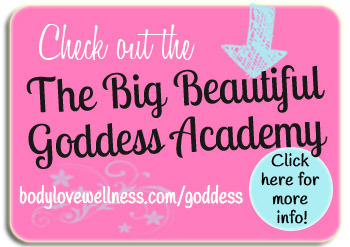 Happy International No Diet Day! I hope you’re celebrating it along with me!
Happy International No Diet Day! I hope you’re celebrating it along with me!
I’m super excited to share this with you. The Big Beautiful Goddess Academy is back and it’s better than ever!
If you’re sick of struggling with food and not feeling good about how you look, and want to be part of a community of supportive women who are committed to changing the way they feel about themselves, the Big Beautiful Goddess Academy is for you.
Just imagine for a moment what it would be like if you ate only when you were hungry and stopped when you were full. What if you could wake up in the morning and love getting dressed, feel great when you look in the mirror and feel confident whether your day involved the office or school or errands or a date with someone special or all of the above? What would that feel like? How will your life be different if you had that?
The Big Beautiful Goddess Academy is set up to give you all that, and more. You’ll learn how to:
Listen to your body and easily eat based on your real hunger and fullness
No longer wait to lose weight before you do what you want to do
No longer feel guilty about what you eat
Feel attractive and confident every day
Love what you see in the mirror
Set healthy boundaries based upon your needs and desires
Have a posse of empowered plus sized women who have your back and support you
No longer compare yourself to others in a negative way
Enjoy your sex life in a whole new way
This is a totally Health at Every Size based program. Whether you’ve been practicing these principles on your own and want some extra support or aren’t really sure what Health at Every Size is, you will love the Big Beautiful Goddess Academy. My approach to Health at Every Size is unique – centering on using divine feminine principles to change the way you relate to your body and increase the amount of joy in your life.
Our first call is in less than a month and the private Facebook community is starting soon. The sooner you enroll, the sooner you get to connect with the other big beautiful goddesses!
Get all of the big juicy details here. See you in class!
Happy Belated No Diet Day + Enrollment Is Open for The Big Beautiful Goddess Academy Group Coaching Program! originally appeared on Body Love Wellness (http://www.bodylovewellness.com) on May 7, 2013.

May 6, 2013
How To Create Change Through Acceptance
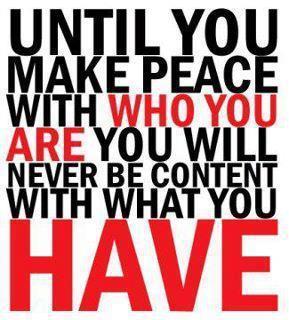 If there’s one thing I learned in my years as a dieter and a coach, it’s this: hating yourself doesn’t work on any level.
If there’s one thing I learned in my years as a dieter and a coach, it’s this: hating yourself doesn’t work on any level.
You can substitute “hating” for “fighting with,” “tormenting,” “being at war with” or whatever. No matter how you say it, it doesn’t work.
It doesn’t create change, it only creates more stress, more of the same.
We’re all taught to fight our imperfections. We’re supposed to fight our bodies — changing our shapes, our weight, our wrinkles etc. We’re supposed to fight our tendencies — too be loud, or rude, or to take the time we need for whatever. And even if you don’t subscribe to all of the societal “shoulds” that are thrown your way, you may feel a push to subscribe to some of them.
You may even hate your tendency to feel the pressure of all of these “shoulds!”
If you really want to change a habit, or a situation, or how you feel about yourself, the only route that will bring you any peace is to start with acceptance. From that place, you can actually make a reasoned decision about whether change is even necessary in the first place.
A Real Life Example
Let’s use a real life example so that you can see what I mean.
Let’s say you have a tendency to binge at night. Maybe you stick to a meal plan during the day, or you just feel like you’re able to eat more reasonable amounts during the day, and then at night you feel like you’re bingeing.
How would you handle it if were fighting with yourself about it? Perhaps you’d judge yourself, feel guilty for eating what you eat, feel like you need to hide what you’re eating from others.
Maybe you’d get really strict with yourself and force yourself to stop eating as much at night for a few nights or a week or two, and then you’d have a particularly stressful day and you find yourself overeating again. Then the guilt and the recriminations are back, and you feel awful. You hate yourself and your lack of willpower and feel stressed out for being out of control.
Introducing The “Kindly Researcher”
Now let’s consider another way to handle this situation.
I’d like to introduce you to your inner “kindly researcher.” Your kindly researcher sees your late night bingeing not as a reason to judge you, but as a wonderful source of information.
It accepts what is and just wants to know more.
You can access your kindly researcher at any time. Use it to ask yourself questions in a kindly way. It might ask you if you’re eating enough during the day, if you’re feelings feel more overwhelming at night, if you’re eating past your comfort point because you miss your ex, or feel creatively stymied, or you hate your boss.
As you engage with this concept, you can start to use the stuff you normally fight as a source of information. Not so you can fight it harder, but so that you can, as best you can, start to give yourself what you need.
It will also allow you to start accepting the parts of yourself that you may not be too thrilled with right now. (And if you feel like there’s no way you could accept yourself or your body, check out this recent post.)
Click to tweet: “If nothing else, loving your perceived flaws is a worthy experiment.”
Accepting Things About Yourself That You Don’t Like
You may be thinking that it’s dangerous to accept things about yourself that you don’t like.
On the contrary, I think it’s dangerous not to accept those things.
I can’t think of an instance where someone (a client, a friend, myself) hated something into changing. For years, I hated my tendency to get flustered when I had to do public speaking, even if it was just a meeting at my job. It was only when I became more self accepting that I began to feel more comfortable with speaking.
When you accept your perceived flaws, you can actually make some decisions about what you want to change, and whether those flaws are really flaws at all. Acceptance allows for a fluidity of energy, and appreciation of tiny steps of progress. Hating aspects of yourself just breeds frustration and more hate.
If nothing else, loving your perceived flaws is a worthy experiment. If you’re reading this post, you’ve probably been trying the other way for a long time. Where has it gotten you so far? I’d love for you to share about it in the comments sections below!
Get my body love tips, and start to see your body in a whole new way!
Name:
Email:
Golda is a certified holistic health counselor and founder of Body Love Wellness, a program designed for plus-sized women who are fed up with dieting and want support to stop obsessing about food and weight. Registration is now open for her group program, The Big Beautiful Goddess Academy. Click here for details!
(Listen to this post here, or subscribe on itunes.)
How To Create Change Through Acceptance originally appeared on Body Love Wellness (http://www.bodylovewellness.com) on May 6, 2013.

April 29, 2013
Some Igigi Fatshion + A HAES Video Series!
Me in my Igigi Bardot dress, looking slightly pensive. Image by Maija Tammi.
Hey, facebook fans, remember how you helped me pick a dress for my TEDx talk last month?
Well, I went with this one! It’s the Bardot dress, which Igigi actually gave me to dress me for the event.
Let me tell you, a gal could get used to this.
Just to give you a little review, the Igigi dress was so perfect! It fit wonderfully and was comfortable to wear all day. I love the three quarter sleeves, the v-neck that shows a little cleavage while still being covered up, and the empire waist. I got so many compliments on it at the event and afterward.
Click here to check out the awesomeness that is Igigi!
By the way, the video of my talk “Why It’s Okay To Be Fat” will be up in a few weeks and I’ll be sharing it then.
Check Out This Free HAES Video Series!
A few hundred of you have already check out the videos, but I wanted to make sure you all know about it!
In this FREE video series you’ll discover:
Exactly what I did to heal my relationship with food and my body quickly and differently than you might expect.
Top 3 big mistakes that keep you stuck and feeling like you need another diet to feel better.
My very simple 6 step body love strategy that will help you even if you feel like a “tough case”.
Over the past 5 years, I’ve been using these techniques and strategies with my private and group coaching clients. These are the best strategies I know to create the big, beautiful life that you really deserve. I look forward to sharing with you exactly how to do it!
Just click here to sign up for free! (Or just enter your info below.) I think you’ll love it.
Enter your info below to receive your free video training now:
Name:
Email:
Golda is a certified holistic health counselor and founder of Body Love Wellness, a program designed for plus-sized women who are fed up with dieting and want support to stop obsessing about food and weight. To learn more about Golda and her work, click here.
(Listen to this post here, or subscribe on itunes.)
Some Igigi Fatshion + A HAES Video Series! originally appeared on Body Love Wellness (http://www.bodylovewellness.com) on April 29, 2013.

April 22, 2013
Why Dove’s Latest “Real Beauty” Video Gets It All Wrong
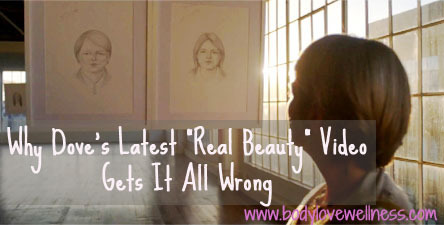 Alternately titled: “Please, Please, Stop Sharing That Video.”
Alternately titled: “Please, Please, Stop Sharing That Video.”
Chances are someone has sent you this video and told you how inspiring it was.
To be honest, I didn’t find it inspiring at all. Instead, it just made me angry.
Here we go again, with Dove pretending to empower women to love their bodies, with THE BIG HONKING CAVEAT that you should love your body only when you’re more conventionally attractive than you realize.
In case you’re not watching the video, the premise of the video is that women are their own worst enemies, who focus on and emphasize their own worst physical qualities. A sketch artist draws their faces based on their descriptions, and then the sketch artist redraws their face based on the description of someone who just met them. Then the subjects see a side by side comparison of the sketch artist’s drawings of them.
That may sound inspiring (ish) but it doesn’t work for a number of reasons. Here are my top five (in no particular order). Feel free to share it when yet another person tells you how inspiring it is!
1. It Promotes The Idea That Fatness And Bigness Equal Ugliness
A lot of these women’s journeys are about learning that parts of their face aren’t as big as they thought. From big jaws to big foreheads to fat faces, much of their relief and excitement is centered around finding out that parts of their face aren’t that big. Because, you know, everything about you should be petite, including your face, because, that’s like prettier or whatever.
One of the first things we learn about the way another woman saw Florence, the thin, blond focus of the video, is that “she was thin, so you could see her cheekbones, and she had a nice, thin chin.” So ladies, if you’re watching this at home, people probably see you as thinner than you think!!! How great is that?!!!
Immediately following that storyline, we hear Kela, another blue-eyed blond who could potentially be as much as a size 10 (!) saying about the image based on her description of herself, “She looks closed off and fatter. Sadder too. The second one [where she looks thinner] looks more open, friendly, and happy.”
So the message is very clear — you’re not as big or as fat as you think. Or, rather, fat and big are still really bad, but you’re not that, so don’t worry.
2. People Of Color Appear But Their Stories Aren’t Told
As one blogger noted (in this great piece), people of color appear for only 10 seconds in footage that totals over 6 minutes. In the main, 3-minute commercial, we hear one African-American woman note that she has a “fat, rounder face” and we see another African-American woman talk about having freckles.
Then, their stories are just dropped, and we don’t see them have the “aha” moment of comparing their images to ones based on descriptions by other people. Their stories are basically presented as afterthoughts. They also just throw in an Asian woman who seems to be happy when looking at the sketches, but there is no info about her at all.
This is yet another way in which this ad reinforces damagingly narrow and exclusionary beauty norms.
3. It Tells Women To Base Their Self Image On How Others See Them
This video puts forth the idea that people around you are probably noticing what they find beautiful about you more than you are. That very well may be true. But, what if it isn’t? And, further more, who cares?
What if people see you as “less beautiful” than you are? And furthermore, what is beauty and why should you allow others to define it for you? What if most people in your life don’t think you’re beautiful? If you look to them for approval of how you look, you won’t get it. That approval has to come from within.
4. It Reinforces The Meme That Women Are Their Own Worst Enemies For No Apparent Reason
The beauty and diet industries spend billions of dollars every year to make women feel inadequate so that they’ll buy their products. And Dove isn’t immune from this — their parent company, Unilever, owns the company that packages the toxic sludge known as Slimfast.
Click to tweet:
“Dove’s vid reinforces the meme that women are their own worst enemies for no reason.”
It’s no wonder that a video about “real beauty” excludes anyone who might be even a little bit fat. Because you wouldn’t want to expand beauty norms to include someone who might buy Slimfast.
So when the participant Melinda says, “We spend a lot of time as women analyzing and trying to fix the things that aren’t quite right and we should spend more time appreciating the things that we do like,” I think it’s important to acknowledge that companies like Dove are constantly reinforcing the idea that we should fix the things that aren’t quite right.
After all, Dove is the company that brought you the “shamovation” called “Dove Go Sleeveless,” a deodorant designed to make your armpits less ugly. If you never realized that your armpits were ugly and required a beautifying deodorant, now you do, thanks to the good folks at Dove.
5. Continues To Uphold The Same, Tired Beauty Standards
We’ve touched on this already, but the underlying message of this video is the idea that we are all more beautiful than we think because we’re closer to conventional standards of beauty than we think.
In other words, it just reinforces the same old bullshit beauty standards.
The message is essentially, “You’re not as fat or big or freckly or wrinkly as you think!”
To me, that’s not inspiring or empowering. It’s just more of the same.
Get great body love tips and more when you subscribe:
Name:
Email:
Golda is a certified holistic health counselor and founder of Body Love Wellness, a program designed for plus-sized women who are fed up with dieting and want support to stop obsessing about food and weight. Check out Golda’s free web training on some of her most unorthodox (and powerful) body love methods here by clicking here!
(Listen to this post here, or subscribe on itunes.)
Why Dove’s Latest “Real Beauty” Video Gets It All Wrong originally appeared on Body Love Wellness (http://www.bodylovewellness.com) on April 22, 2013.

April 15, 2013
Is Emotional Eating Really So Bad?
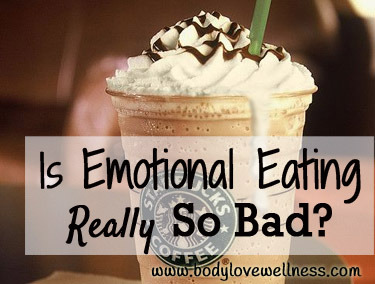 Yesterday, I used a frappuccino to deal with some anxiety.
Yesterday, I used a frappuccino to deal with some anxiety.
And, it worked.
You see, a lot of really cool stuff has been happening lately. This is stuff that I’m really grateful for and excited about, like the TEDx talk that is (OMG) next week, being named a finalist in the She Writes/ Seal Press book publishing contest, working on some new coaching projects, etc.
All of this means new levels of visibility and new shoes to step into.
While my mind and soul are completely and totally on board for all of this change, my stomach isn’t so sure.
So I’ve been feeling like an epic bundle of nerves. As some of my Facebook fans know, I’ve been having bizarre dreams about Alan Alda holding me hostage and elevators to other dimensions.
Yeah, it’s been weird.
My stomach had been in knots for about 24 hours and I had tried a lot of techniques to calm myself down and connect in with my feelings.
Here are a few that I tried:
Deep Breathing — This is a key technique for relaxing your body and quieting the mental chatter that makes it hard to hear yourself. (For a “how-to” on my favorite deep breathing technique, click here.) I did this a bunch of times, but my stomach seemed to only relax for a few minutes and then it started back up.
Having A Mental Chat With My Stomach — To do this, I put my hands on my belly, closed my eyes, did some deep breathing, and asked my stomach what it was experiencing, what it was anxious about and what I could do for it. A lot of my anxiety was around the TEDx talk, so I tried to give it some reassurance. This also only worked for a few minutes.
Intentionally Feeling My Feelings — Anyone who’s done group coaching with me is no stranger to this technique. This can take some time to master, but essentially it’s a process of feeling your emotions within your body, as best you can, for as long as you can, until that feeling starts to dissipate. I felt like this had really worked for me, but again, it only lasted a short time.
Then, yesterday, I woke up with the answer.
A frappuccino.
Now, as you may remember, I’ve written about frappuccinos (frappuccini?) before. I have a love/meh relationship with them, and haven’t had one since my last post.
I don’t normally talk about what I eat on this blog, because I don’t think it’s helpful and it can often be triggering. To me, the whole point of intuitive eating is figuring out what feels good to you, without worrying about what other people do.
Click to tweet: “Food is not just fuel and you are not a machine.”
I find that, for myself, I feel best if I don’t eat really sweet stuff too often. If I have a real hankering for something, I’ll have it, but in the last few years or so I just don’t get those hankerings that much.
Anyway, for whatever reason, I felt that a frappuccino would stop the stomach jitters for long enough such that my body could be reminded about how it normally feels and let go of the freakout.
So I ran some errands and got myself a frappuccino. (I tried the new, hazelnut one which was really delicious.) And within a few minutes my stomach was feeling relaxed again. It’s been over 24 hours now and I still feel like myself.
Ideal vs. Real
I have a feeling that those of you reading this are having pretty varied reactions to this story, ranging from: “Why are you making a big deal about drinking a frappuccino in the first place?” to “Why is a coach who does intuitive eating work think that drinking a frappuccino to deal with your feelings is okay?”
Here’s the thing. Drinking a frappuccino to deal with anxiety is definitely not ideal and I’m not recommending it in any way.
BUT, whether you like it or not, food does have an emotional component. Food affects us in many ways. Clients always tell me that “they want food to just be fuel” but it’s not. Food is not just fuel and you are not a machine. You are an extremely complex being and eating evokes memories and emotional responses.
I don’t know why one grande frappuccino seemed to “cure” my anxiety over giving a big talk. On a neurochemical level, it probably caused my brain to release extra serotonin, making me feel good. On an emotional level, maybe it felt like a treat, which made me feel like it was time to relax. Or maybe it was just that I got what I wanted, which always feels good.
From my perspective, I wouldn’t recommend using food as a way to deal with tough emotions and problems on a really regular basis, and if you feel like you’re in that boat, you may want some support (this can be a great place to start). But to me, the key is to always approach yourself with kindness. And there are way worse things in the world than eating emotionally every once in a while.
So if you do this, be kind to yourself, have chat with yourself, use some of the techniques above, and if all else fails, just eat and approve of yourself for it.
Get great body love tips and more when you subscribe:
Name:
Email:
Golda is a certified holistic health counselor and founder of Body Love Wellness, a program designed for plus-sized women who are fed up with dieting and want support to stop obsessing about food and weight. To learn more about Golda and her work, click here.
(Listen to this post here, or subscribe on itunes.)
Is Emotional Eating Really So Bad? originally appeared on Body Love Wellness (http://www.bodylovewellness.com) on April 15, 2013.

April 8, 2013
Are “LOVE YOUR BODY!!!” Efforts A Bad Idea?
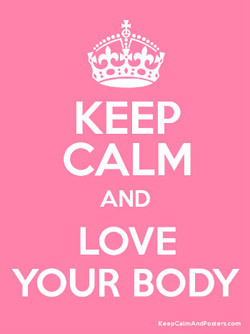
Is loving your body just another “should” that you can’t live up to?
I want to let you in on a little secret.
I really don’t like most “Love Your Body” campaigns.
Just as you are bombarded with reasons why you SHOULD lose weight, change your hair, whiten your teeth, change your body shape etc., you’re now also getting the message (sometimes, a corporate message) that you SHOULD love your body.
Whenever I write about loving your body (like just last week), I get a lot of pushback. No matter how many times I say that loving your body is not an imperative, that I’m just giving advice for those who want to try to love their body more, I get a lot of angry responses from people who say they can’t love their body or that they’re sick of feeling pressure to love their body.
I want to say again that I get it. I really do. We all have so much pressure on us to be perfect people by being perfect in our eating habits, work habits, exercise habits, parenting habits, and on and on, so loving our bodies feels like another item on our endless to-do list of “shoulds.”
It seems to me that many Love Your Body campaigns come across as empty reminders that you’re supposed to be doing yet another thing that you’re not doing. They also give the impression that loving your body is like flipping a switch, something that you just do, and then all of a sudden you’re taking selfies for your fatkini tumblr and living a badass, body-loving lifestyle.
I think that can happen for some people, but it’s the rare person who can really flip that switch without a lot of effort.
So I want to share three essential truths about loving your body that I’ve encountered in my five years of coaching people to love their bodies.
TRUTH: Loving Your Body (Usually) Takes Time
Before I started my coaching practice, I worked on loving my body for about a year. After a year, I felt that I was in a good enough place to work with other people.
I had made huge strides in that year, but the way I feel about myself and my body has changed and deepened since then in ways that I couldn’t have imagined.
I literally don’t think negative thoughts about my body EVER any more. They just don’t enter my mind. I don’t have bad body days or days when I blame my body for my problems.
The way I feel about my body should not be a goal for you (see Truth #3) but I will tell you that the process takes time to sink in in a really deep way. If you want to try to love your body, you need to give yourself the time and space to see what loving your body means and can mean for you. If you don’t give yourself that time, if you throw in the towel when a bout of body hatred comes back, the whole process will seem impossible.
TRUTH: Loving Your Body (Usually) Isn’t Easy
When 99% of the messages you receive about your body are that your body is not okay, loving it is a tough job.
It takes an immense amount of mental work to think about your body in positive ways, to banish negative thoughts, to put your body first when work, familial, and social obligations say you should put it last.
It takes commitment to bounce back from “bad body days.” It takes guts to set boundaries with people who criticize your body.
I have clients that join my group program, The Big Beautiful Goddess Academy, every time it’s offered. And that isn’t because they failed the first few times or anything of the sort. They do it because they know they want to do more work on loving their bodies. They know that they need and want to go deeper with the process and they know they need more support to keep going.
So if loving your body is HARD for you, you are not alone. This is part of the process.
Click to tweet: “If loving your body is hard for you, you are not alone.”
TRUTH: Loving Your Body Requires You To Throw Away Old Models Of Perfection
I feel like I address perfectionism very often in this blog, and it makes sense. Folks who struggle with negative body image are accustomed to deflecting attention from their bodies by being “perfect” in other aspects of their lives.
But loving your body requires you to let go of perfectionism in a big way.
Just like loving your body as it is requires you to let go of your prior concepts of an ideal body, the journey of loving your body requires you to let go of your concept of the perfect way to love your body.
In other words, it’s time to let go of your idea of what loving your body has to look like.
If loving your body sounds like a good idea, take one step toward it. Just one step. Peruse this blog, or check out my body love resources or my book.
There Is NO Love Your Body Imperative
If you take one thing away from this post, I hope it’s that you don’t have to love your body. There is no imperative. There is no pressure. And if you want to love your body, it takes patience, and work, and a bit of love for the process.
Get great body love tips and more when you subscribe:
Name:
Email:
Golda is a certified holistic health counselor and founder of Body Love Wellness, a program designed for plus-sized women who are fed up with dieting and want support to stop obsessing about food and weight. To learn more about Golda and her work, click here.
(Listen to this post here, or subscribe on itunes.)
Are “LOVE YOUR BODY!!!” Efforts A Bad Idea? originally appeared on Body Love Wellness (http://www.bodylovewellness.com) on April 8, 2013.


